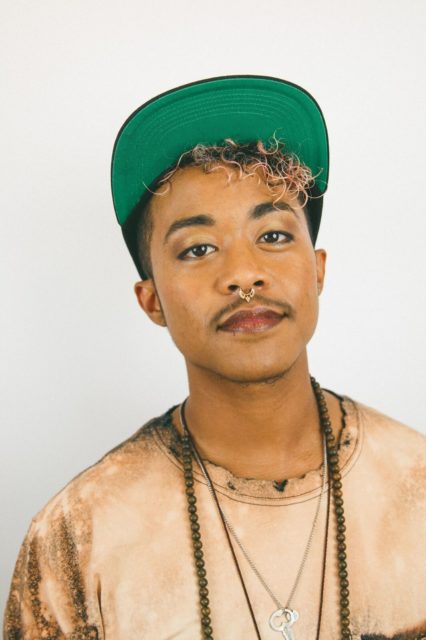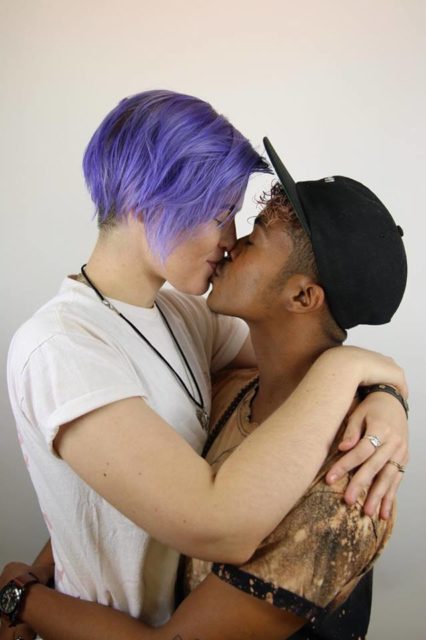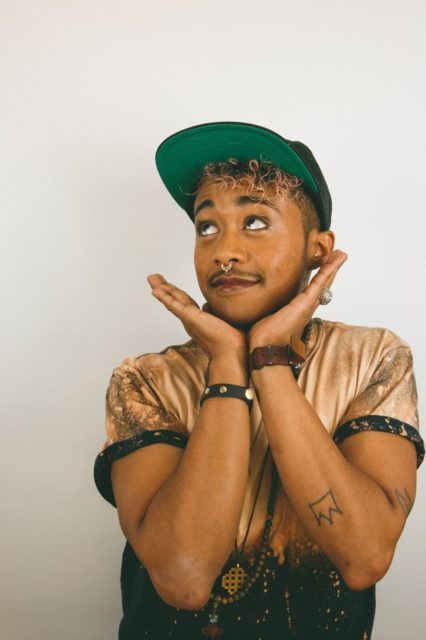
“My calling is to nourish people.” That’s how Jayden Bedard explains what motivates his work in the world. The queer, trans, black veteran holds a fierce commitment to his communities, to his own wellbeing, and to ensuring that people at the intersections of multiple marginalized identities can survive and thrive.
Bedard is a yogi, a cannabis advocate, a culinary enthusiast, and an intersectional activist. His Instagram handle, @soul_alchemist411, is a reference to his identity as an alchemist, someone who seeks to use the tools the universe has given them to manifest the reality they want.
Bedard’s commitment to growth, exploration, and connection is palpable and contagious. His enthusiasm puts a smile on your face, and his conviction will put a little extra fuel in your tank for the important work ahead.
Bedard spoke with GO about his focus on intersectionality; his passion for supporting veterans, queer and trans people of color, and everyone with whom he shares community; and the vision that keeps him hopeful amidst a turbulent political climate.
Help Jayden Bedard fundraise for his top surgery.
On his identities:
“Something I’ve been trying to do lately with my activism is to incorporate different intersections of my life to show people that I don’t just exist one way. I’m not just a vet, or black, or queer, or trans. All of those things interact with one another.
“For lack of better terminology, I’m a black trans nonbinary person of a spiritual experience. As for pronouns, just don’t call me late for dinner! (laughs) I prefer the pronouns that keep me safest and those tend to be he/him or they/them.”
On what he does and why:
“I am a veteran, and I am in school for culinary arts. My calling is less about cooking for people and more about nourishing people.
“I am a medical cannabis patient. Like many veterans, I suffer from a lot of neurological disorders. I have PTSD, bipolar disorder, and dissociative identity disorder. All of these things are kind of unmanageable without treatment. So many veterans commit suicide after getting out of the military because of the PTSD and the dependence they form on pharmaceutical treatments like opiates. The current number is 22 a day. I found myself in that position after I got out. But, in the past decade, I’ve been able to treat myself only with cannabis. And it’s the reason I’m still here today.
“I’m currently the Vice President of my local Los Angeles chapter of a national nonprofit called Weed for Warriors. It’s a nonprofit that educates veterans and civilians about the high rate of veteran suicide and the high rate of lack of care by the VA (the U.S. Department of Veterans Affairs). I’m working to make the cannabis industry intersectional with veterans, and with trans people, so that everyone can access the treatment they need.
“It’s really hard to be an open queer trans person in both the military and the cannabis industry. The war on drugs is not a war on drugs, it’s a war on people of color. There’s a huge disconnect that comes with being black and being in this industry. There’s also a huge disconnect between being trans and being black. That’s why I live as openly as I do—to try to break down those stereotypes.”

On his path through the military:
“I am a military brat. I have not known a moment of my life without the military. I enlisted as a junior in high school. At that time they were handing a ton of money to people who were enlisting—it was still during the height of the war. I used that as a way to get out of my house.
“Joining the military at 17 allowed me to emancipate myself from my parents. I served 3 years in active duty. My MOS, my job, was as a combat medic.
“I didn’t exactly know I was trans yet. I didn’t have the language. I just knew I wasn’t right in my body. I do remember from a very early point in my life telling my mom I wanted to be a cowboy. I really looked up to John Wayne for some reason; I wanted to be like him.
“While I was in the military, this feeling just sort of manifested as being a lesbian. I didn’t really have any issues being out. Don’t Ask Don’t Tell was still very much a thing. I got caught a lot fraternizing, especially in basic training, getting caught making out in the latrine, things like that.”
On the evolution of his relationship to gender:
“After I had finished my three years in active duty, the day after I turned 19, I attempted suicide. I woke up from a coma after 5 days. After that point is when my spiritual shift started to happen. I found alchemy, I found gender, I found a language for what I was going through.
“Gender became no longer the construct that it was and is to everyone else, but instead this amazing freedom. Everyone I know uses the term “gender dysphoria.” I don’t. I experience gender euphoria, even with all the bits and doodads I feel like could be better off on someone else.
“I am made of the same energy as this universe, and I am exactly where I am supposed to be. I am moving through the world in the way I am destined to move through it. That’s the beautiful thing about being trans. It’s the ultimate form of being an alchemist: transmuting what we have into something new.
“I hope other people can understand that this can be their truth, too. At the end of the day, are you really unhappy with yourself, or are you unhappy with how other people see or treat you? I was never unhappy with the things that I have—just with how people perceived me. And truthfully, I don’t give a fuck about what other people think, because I am happy as me. They’re not the ones living my life and trying to accomplish my goals.
“The only time I really experience dysphoria these days is when I find my safety comes into play, like when I’m asking myself which bathroom to use because I don’t want to get beat up today. Otherwise, I am steady loving me.”
On the communities he calls his own:
“I exist in many, many, many intersections. I am actively a part of many communities, even if they don’t support me. As a trans person you know just how silent the T in LGBTQ can be. But that doesn’t make you any less a part of that community.
“I am part of the queer community because those are the people I share a certain experience with. I am part of the cannabis community because it’s something I partake in every day. Do a lot of those people consider me part of their community? Probably not. What about veterans? Probably not either, especially because I don’t accept this president and I don’t agree with a lot of what this country stands for.
“I am being an activist simply by existing and by continuing to exist loudly. Nobody is going to police me out of my communities.”

On the message he wants to share with the wider LGBTQ community:
“Being called out is not a bad thing. It’s a way to change. You’re my friend, so I’m going to call you out because I care. I’m not saying you are a horrible, evil person. I’m letting you know that you are doing something right now that is harmful, and now you have language for it and you can educate yourself and change your behavior.
“White people tend to have this knee-jerk reaction, where they ball up and shut down. What I’m saying is: you’re hurting me and this is how it can stop. Listen.
“A second big issue in the LGBTQ community is misogyny. Sometimes I joke that FTM doesn’t stand for female to male, but female to misogynist. Some people who are queer or trans think that they escape being misogynist because they are a part of our community. The problem is they’re not holding themselves accountable for how they’re talking over and hurting women and femmes.
“A lot of them are concerned about continuing to be popular, which is why they’re nervous to talk about these things. Just because you have a million followers doesn’t mean you’re doing the right thing. Popular isn’t always right. If we want to escape the gender binary we have to stop uplifting the people in our communities who reinforce it. It’s only making our work that much harder.”
On his role models:
“This is going to sound so cheesy but one of my biggest role models is my spouse, Madi. And my roommate Bennett. These are two people I am constantly trying to be more like. They’re both trans. I want to be more humble and in touch with myself like Madi. They do such important work. If it were me, I would be shouting it from the mountain tops, but they’re just low-key doing it.
“I also want to be more courageous like Bennett is. He doesn’t let fear determine him. He has a lot of privilege, but he isn’t afraid to use it and help people no matter what others think. He has things to lose when he stands up for people like me, but he notices where he has the ability to lift someone else up and he does. During the marches after the election, he stood next to me and basically carried me on his shoulders when people were trying to silence me and my chants.
“If I didn’t have this home with these two people to make my magic in, my magic wouldn’t be as strong.
“Another one of my role models is Prince. No matter what spotlight was on him, he just did what he was going to do. He presented himself in the way I like to present himself. He didn’t care about what was masc or femme. He put things on because he thought he looked good in it, and that’s all that matters. He gave me some lines to scribble outside of.”
On what gives him hope under the new administration:
“What keeps me hopeful during this time is that I am here during this time. It would worry me so much more if I heard about this in a history class. I am glad that I am here right now to change this. The discomfort that we are feeling shows us that it’s time to change.
“It is human nature to evolve, that is why we’re different from any other species on the planet. That’s what makes us us: the ability to be uncomfortable and do something about it. Some of us have felt uncomfortable for a long time, but more and more people are feeling it now. We’re coming to the pinnacle; we’re about to come over the hill.
“The reason we are hurting is because we can’t close our eyes to the reality of the world. If we can’t close our eyes, it means we are here to change it. That’s beautiful to me. We are all becoming aware of the power we have.”
To learn more about Jayden’s work, check out the Weed for Warriors Project at http://www.wfwproject.org/ and visit him on Instagram @soul_alchemist411.

What Do You Think?